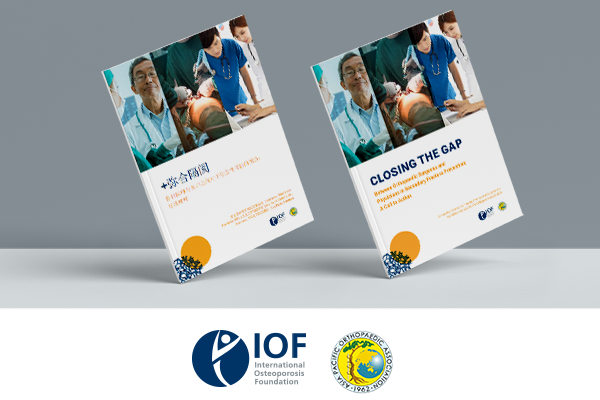IOF and APOA urge orthopaedic surgeons to play a role in secondary fracture prevention

A new joint initiative by the International Osteoporosis Foundation and Asia Pacific Orthopaedic Association calls on orthopaedic surgeons to strengthen collaboration with physicians to improve secondary fracture prevention and patient outcomes.
Asian countries are facing the most marked increase in fragility fractures globally, with the number of people at high fracture risk expected to double from 2010-2030. By 2050 approximately half of global hip fractures will occur in Asia, placing an enormous human and cost burden on health systems across the region.
With the launch of ‘Closing the Gap Between Orthopaedic Surgeons and Physicians in Secondary Fracture Prevention: A Call to Action’ the International Osteoporosis Foundation (IOF) and the Asia Pacific Orthopaedic Association (APOA) are together appealing to orthopaedic surgeons in the region to play a greater role in post-fracture management of patients with osteoporosis.
Dato’ Dr Joon-Kiong Lee, Chair of the IOF Regional Advisory Council for the Asia Pacific stated:
“In our region, as in other parts of the world, a ‘missing link’ has been identified between the various medical experts who manage osteoporosis patients, and the orthopaedic surgeons who see fragility fracture patients in their daily practice. The new IOF-APOA initiative provides a platform to increase awareness and collaborative efforts between the orthopaedic surgeons and the various physicians involved. Our intention is to generate both the interest and confidence needed to effectively manage osteoporosis and fragility fractures as a team effort.”
The new publication features key messages related to fracture management, post-fracture rehabilitation, fracture healing and national fracture registries. Most importantly, it highlights ten urgent actions which should be taken by the medical community, and orthopaedic surgeons in particular. It underscores the leading role that orthopaedic surgeons can play in the development and implementation of Fracture Liaison Services or Orthogeriatric Services in their hospitals and clinics.
Dr David Siew-Kit Choon, Past President, Asia-Pacific Orthopaedic Association and co-author added:
“Currently, approximately 80% of fragility fracture patients are not diagnosed and treated for osteoporosis, the underlying cause of the fragility fracture. As the risk of re-fracture is highest in the first two years following a first fracture, it is clear that timely diagnosis and treatment is essential. In keeping with APOA’s core mission to promote education and fellowship amongst orthopaedic surgeons, we join IOF in calling on all orthopaedic surgeons to work with physicians in a concerted effort to close the treatment gap. Through their greater involvement in effective post-fracture care and management, the orthopaedic community can ultimately help millions of patients avoid severely debilitating and life-threatening recurrent fractures.”
As the leading global organization in the osteoporosis field, the International Osteoporosis Foundation advocates for the implementation of coordinated, multidisciplinary post-fracture care programmes in all hospitals that treat fracture patients. Such services have been shown to be the single most important tactic to directly improve patient outcomes and reduce spiralling fracture-related healthcare costs worldwide.
IOF President Professor Cyrus Cooper underlined the importance of IOF’s collaboration with APOA and with the orthopaedic community:
“We hope that this Initiative, arising from close international collaboration between IOF and colleagues in APOA, will lead to concerted efforts by all orthopaedic surgeons to work hand in hand with medical organizations and healthcare authorities across the region to improve post-fracture care. If widely implemented, the key actions outlined in the IOF-APOA ‘Call to Action’ will certainly result in improved patient outcomes, and ultimately in a reduction in the region’s fracture burden.“
IOF and APOA share complementary visions and missions, with each organization having a strong record of operations and expertise in the fight against fragility fractures. The launch of the IOF-APOA Orthopaedic Initiative follows a collaborative agreement between IOF and APOA in which the two organizations pledge to work in cooperation for the benefit of prioritisation, funding, implementation and global sustainability in post-fracture care.
Professor Cooper added: “IOF looks forward to continuing its effective collaboration with the Asia-Pacific Orthopaedic Association as we work together in the future to advance fracture prevention and post-fracture care in the Asia-Pacific.”
###
Further reading:
- Closing the Care Gap Between Orthopaedic Surgeons and Physicians in Secondary Fracture Prevention: Call to Action: English, Chinese Simplified, Chinese Traditional
- Executive Summary IOF-APOA Call to Action: 10 recommendations: English, Chinese Simplified, Chinese Traditional
ABOUT IOF
The International Osteoporosis Foundation (IOF) is the world’s largest nongovernmental organization dedicated to the prevention, diagnosis and treatment of osteoporosis and related musculoskeletal diseases. IOF members, including committees of scientific researchers as well as 266 patient, medical and research societies, work together to make fracture prevention and healthy mobility a worldwide heath care priority.
https://www.osteoporosis.foundation info@osteoporosis.foundation
@iofbonehealth
ABOUT APOA
The Asia Pacific Orthopaedic Association (APOA) is a regional organisation of orthopaedic surgeons mainly from the Asia Pacific region. APOA has 24 member chapters and more than 59,000 members from over 40 countries. The member chapters and federations are Australia, Bangladesh, Brunei, Cambodia, China, Hong Kong, India, Indonesia, Japan, Korea, Malaysia, Myanmar, Nepal, New Zealand, Oman, Pakistan, Philippines, Saudi Arabia, Singapore, Sri Lanka, Taiwan, Thailand, Turkey and Vietnam.
APOA’s core mission is to promote the education, research and fellowship amongst orthopaedic surgeons in this region. APOA’s conferences and fellowships are sought after by young surgeons while established and renowned senior surgeons provide the experience and resources to assist younger fellows.